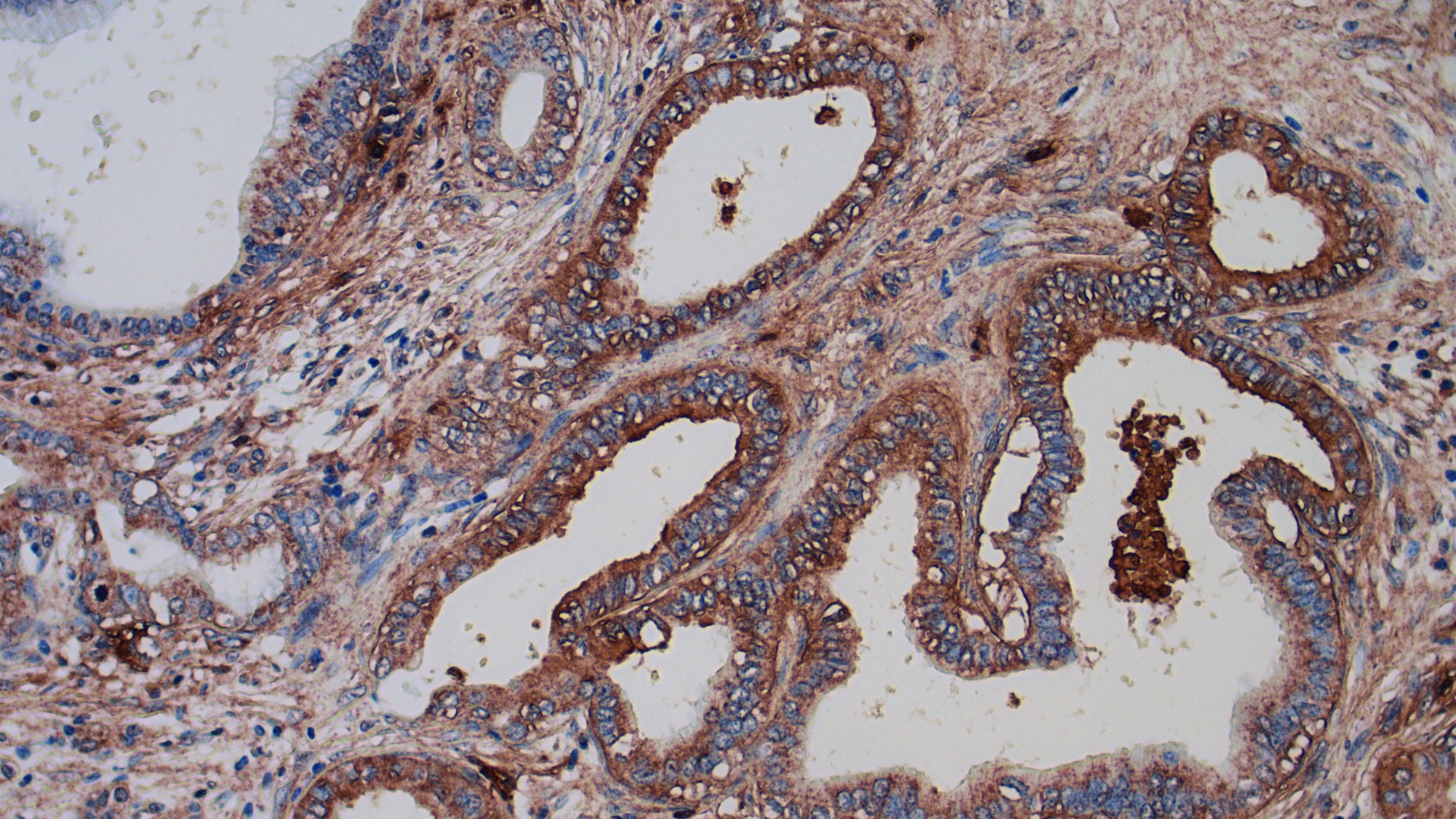
Immunohistochemical staining of an SRI molecular guidance system in human pancreatic tissue.
The Targeted Antigen Loaded Liposomes platform could bring a new era of effective and personalized treatment for diseases.
Patients with solid tumors, including pancreatic cancer and triple-negative breast cancer, often endure limited and debilitating treatment options, such as chemotherapy and radiotherapy. Conventional cancer therapies are unable to specifically target cancer cells, which significantly restricts the effectiveness of the treatment and can leave patients with side effects and negative outcomes.
Researchers at SRI are working on a new targeted immunotherapy for cancer, specifically solid tumors. The technology, known as Targeted Antigen Loaded Liposomes (TALL), is a novel therapy that utilizes liposomes—small spherical vesicles composed of lipids—to deliver synthetic antigens to targeted cells in a controlled and precise manner. TALL is a more effective and personalized treatment than conventional immunotherapies, which often lack specificity for cancer cells, leading to adverse side effects on healthy cells.
“Traditional treatments for these cancers are typically ineffective unless the cancer is caught at an early stage; however, these cancers are also difficult to detect, often only being diagnosed at stages two or three,” said Indu Venugopal, principal investigator for the TALL program in SRI’s Biosciences Division. “Also, the types of treatment options offered to patients of these cancers are known for producing debilitating side effects. One of the reasons for this is the lack of specificity in targeting of treatments: SRI’s TALL system solves this issue by utilizing peptidic ligands from SRI’s Fox Three platform for targeted delivery.”
In TALL, liposomes loaded with known antigens are engineered to target tumor tissues. This tumor targeting increases the efficiency and accuracy of antigen delivery. Once the formulated liposomes are inside the target cancer cells, the encapsulated antigens are trafficked by those cells and presented to the immune system, activating a targeted immune response specifically against the tumor. Unlike conventional treatments, which are unable to directly target cancer cells and are thereby limited in effectiveness, TALL’s localized delivery of antigens enhances the immune system’s recognition and response, which can lead to more effective and efficient immunotherapy.
One of the novel features of TALL is that it leverages the individual’s preexisting viral immunity to focus the immune system to activate a robust anticancer response. Patients who are vaccinated using the MMR (measles, mumps, and rubella) vaccine are already primed to recognize the measles virus as an invader. With TALL, liposomes encapsulate synthetic peptides whose sequence has been derived from measles and deliver them to cancer cells. Once the measles peptide is recognized by the immune system, the memory or secondary immune response results in the destruction of those cells.
“Making cancer cells appear as if they were infected with a pathogen such as the measles virus is core to the TALL concept of activating and utilizing the human immune system to fight cancer,” said Dr. Venugopal. “But achieving this is the hard part. The measles virus was chosen because it is well-studied, with a vast body of literature on it. Antigenic peptides, whose sequences are derived from the measles virus, can activate a robust secondary antitumor immune response when internalized by cancer cells.” This comprehensive body of data on measles peptides helped Dr. Venugopal and her team select the antigenic components that best fit the TALL treatment criteria. The highly targeted nature of TALL (due to its utilization of SRI’s proprietary Fox Three platform) and the novel idea of utilizing previously encountered antigens make TALL unique among immunotherapies.
TALL’s success did not come without challenges during its development. One significant challenge was the optimization of liposome design—including size, surface modifications, and stability—to ensure efficient targeting and antigen release. Additionally, the selection of appropriate antigens and understanding the immune response mechanisms in cancer was crucial for achieving desired therapeutic outcomes.
SRI’s TALL solution is unique as it seeks to enhance and advance immunotherapy and precision medicine by enabling targeted delivery of antigens that most people have already encountered, whether through vaccination or infection. This will lead to improved therapeutic efficacy, reduced side effects, and the availability of immunotherapy to a broader patient population. “Although treatment with TALL alone shows a substantial reduction in growth of lung, triple-negative breast, and pancreatic cancers, it can also be synergistically combined with other immunotherapies, such as checkpoint inhibitors, to generate a powerful anticancer treatment,” said Dr. Venugopal. “The hope is that our own immune system responses can be honed for treatment to replace debilitating conventional therapies, such as chemotherapy and radiotherapy.”



